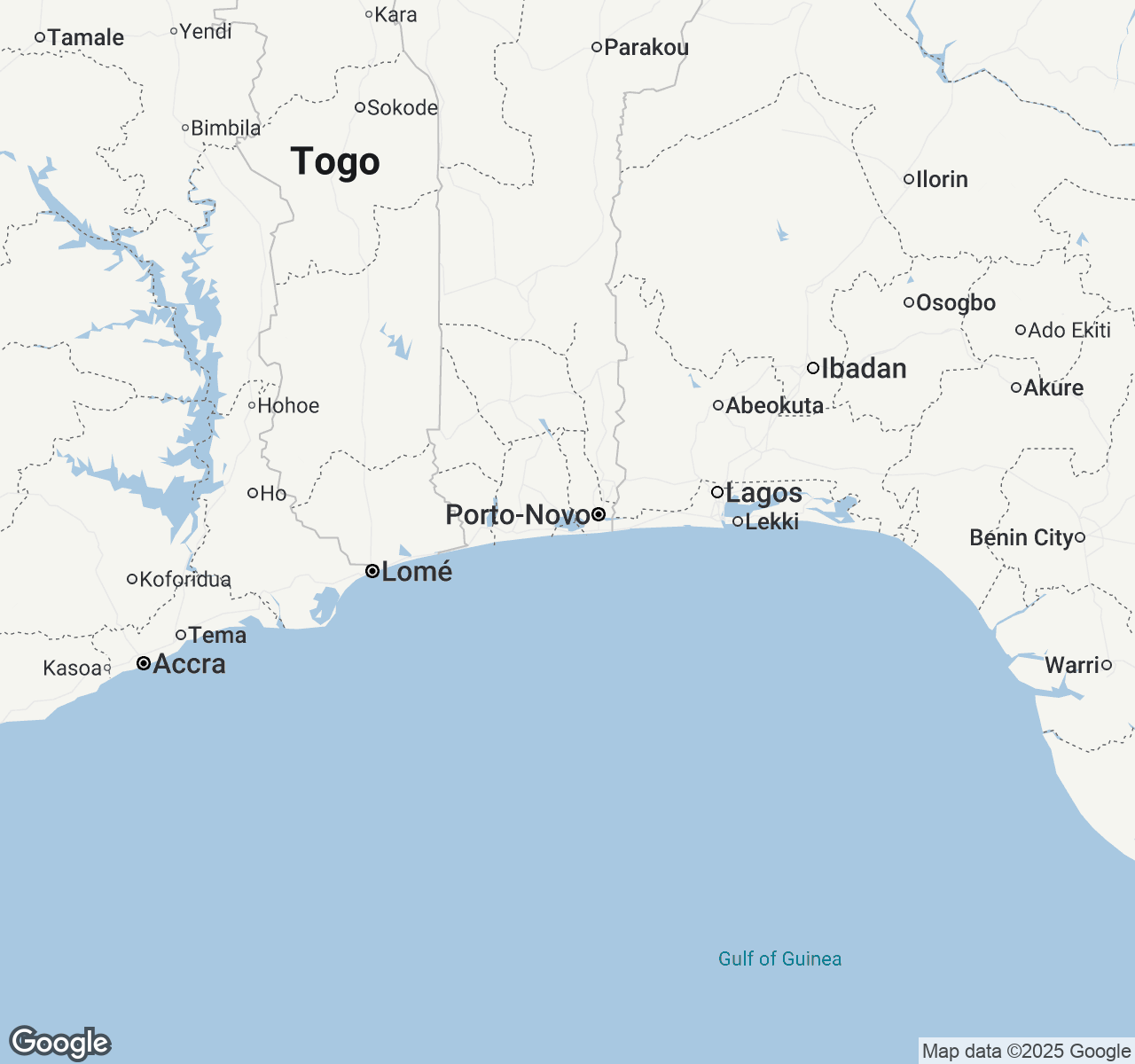
Things to Do in Cotonou
Discover the best of Cotonou
Plan Your Trip
Essential guides for timing and budgeting
Top Things to Do in Cotonou
Discover the best activities and experiences. Book now with our trusted partners and enjoy hassle-free adventures.
Explore Cotonou
Ancien Pont Bridge
City
Artisanal Center
City
Cotonou Cathedral
City
Cotonou Central Mosque
City
Cotonou Marina
City
Dantokpa Market
City
Fidjrosse Beach
City
Fondation Zinsou
City
Ganvie Stilt Village
City
Ganvié Stilt Village
City
Lake Nokoue
City
Lake Nokoué
City
Place Des Martyrs
City
Port Of Cotonou
City
Stade De Lamitie
City
Villa Karo
City
Your Guide to Cotonou
About Cotonou
Where the Gulf of Guinea meets the vibrant heart of West Africa, Cotonou pulses with an intoxicating blend of commerce, culture, and coastal charm. This bustling economic capital of Benin is a symphony of organized chaos, where colorful pirogue boats bob alongside modern cargo ships, and the air thrums with the melodic cadence of Fon, French, and Yoruba voices negotiating in sprawling markets. The legendary Dantokpa Market spreads like a living organism through the city's core, its labyrinthine passages revealing treasures from across the continent—hand-woven textiles, aromatic spices, and intricate bronze works that whisper stories of ancient kingdoms. Beyond the commercial energy, Cotonou's soul reveals itself in quiet moments: fishermen casting nets at dawn along the Nokoué Lagoon, the gentle sway of palm trees lining sandy beaches, and the warm hospitality of locals who transform strangers into friends over shared bowls of akassa. This is a city where tradition and ambition dance together, creating an authentic African urban experience that captivates rather than overwhelms.
Travel Tips
Transportation: Navigate Cotonou using 'zémidjan' motorcycle taxis for quick trips (negotiate fare beforehand, typically 200-500 CFA). For longer distances, shared taxis called 'wémà' are reliable and affordable. Download offline maps as GPS can be unreliable in dense market areas.
Money: Bring euros or US dollars to exchange for West African CFA francs at banks or authorized bureaux de change. ATMs are limited and often empty—carry cash. Mobile money (MTN Mobile Money) is widely accepted for purchases and transfers.
Cultural Respect: Greet people with 'Bonjour' and a handshake; always ask permission before photographing individuals. Dress modestly, especially when visiting markets or religious sites. Learning basic Fon greetings like 'Kudo' (hello) earns instant respect and smiles from locals.
Food Safety: Enjoy grilled fish and meat from busy street stalls where turnover is high. Try local specialties like akassa, amiwo, or fresh coconut water. Avoid tap water—stick to sealed bottled water. Peel fruits yourself and eat at establishments popular with locals.
When to Visit
Cotonou's tropical climate creates distinct seasons that significantly impact your travel experience. The dry season (November-March) offers the most comfortable conditions with temperatures ranging from 24-32°C, minimal rainfall (under 50mm monthly), and cooling harmattan winds from December-February. This peak season sees hotel rates increase 20-30% and flight prices rise by 15-25%, but rewards visitors with perfect beach weather and ideal conditions for exploring markets and cultural sites. The transitional months of April and October provide excellent value, with temperatures around 26-33°C, occasional brief showers, and accommodation prices dropping 15-20% below peak rates. The rainy season (May-September) brings heavy downpours, high humidity, and temperatures of 23-30°C, with July seeing up to 400mm of rainfall. However, this period offers the lowest prices (30-40% below peak), lush landscapes, and fewer crowds. Key festivals include the vibrant Fête du Vodoun on January 10th, celebrating traditional religion, and the Festival des Arts et de la Culture du Bénin in December. Budget travelers should target May-June or September for substantial savings, while beach enthusiasts and culture seekers will find December-February optimal despite higher costs. Business travelers often prefer the shoulder seasons for better availability and moderate pricing.

Cotonou location map